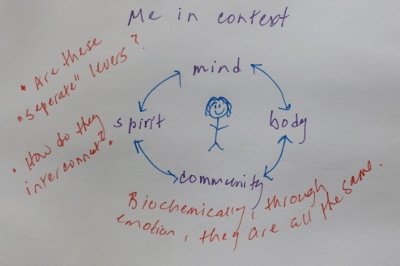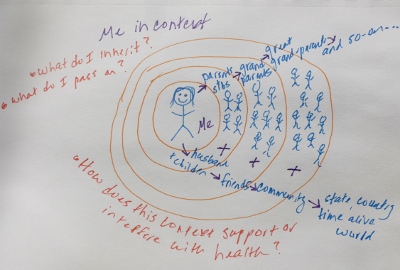I have been on an incredible learning journey over the last few weeks that excites me. A couple months back I was feeling like a “blobby mess” emotionally when confronting the possibility of living with Lyme forever. I chose to deal with this by committing to stay open to the universe to show me a path forward. This post is about what I have learned. It fits well in a composting words blog because much of what I am “discovering” are the same lessons that have been rediscovered or “composted” in one way or another across centuries of thinkers and currently across various modern disciplines such as medicine, psychology and even early childhood development research.
A framing question: How did I come to the understanding that the legacy of my grandfather’s tragic death in World War II which led to my Mom’s abandonment as an infant has some connection to my health today?
Come follow along and then let me know what you think. I started out listening to this interview of Gabor Mate, MD, author of “When the Body Says No: Exploring the Stress-disease Connection”. This talk led me to ask the question, “What if the reason that I have auto-immune thyroid disease and am having difficulty healing from Lyme Disease share the same root cause?” And if that is true, could I unlock a path forward that might help with both? I then began to read Dr. Mate’s book and continued to pay attention to other things the universe put in my path and the following ideas and questions emerged.
- Human beings are designed to be healthy and happy unless something interferes with that state. Our bodies have a great capacity to heal when given what they need to be healthy.
- No disease has a single cause and illness has to be understood in context. Our context as individuals includes our physical body (diet, exercise, toxins, injuries, illness) as well as who we are in this place, in this time within our family and community. The biochemistry of mind, body, spirit and community is identical and in constant communication. In other words our emotions create the exact same biochemicals as our hypothalamus and adrenal and pituitary glands. (WOW!)
- The stress-responses that our parents unintentionally pass along to us as well as the stress-responses we create in very early child-hood are more powerful predictors of major illness such as cancer and autoimmune conditions than our genes. (WOW II!)
- Human beings are meant to be in relationships. Our society’s over-focus on individualism means that people are often more disconnected than ever from their families, neighbors and community.
The Big Questions:
- If illness requires both a microbe or cause plus vulnerability of the host to manifest;
- if lung cancer most often requires smoking plus a specific host stress pattern to manifest;
- if cancers and serious auto-immune illnesses such as ALS and MS occur far more often in people with certain stress-patterns;
- if many stress-patterns are set during infancy and very-early childhood before we develop more mature coping mechanisms (Mate);
- if “the body remembers” doses of “toxic-stress” in very early childhood which manifest in later life as diabetes, heart-disease, depression & obesity and, epigenetics tells us that the expression of genes are then influenced and this expression pattern can then be passed on to the next generation. (Jack Shonkoff, MD, Center on the Developing Child, Harvard)
Then . . .
- what are my stress patterns and can addressing them help me to heal in ways that medications cannot?
- has Borrelia Burgdorferi (Lyme Disease) become so successful (persistent in certain hosts) because it thrives in today’s high stress and disconnected society?
- is it as important to understand myself as it is to understand how Borrelia Burgdorferi impacts the body?
As you have probably gathered, my answer to the above questions is yes. So back to World War II and my health today.
I have had a pattern of striving to do better (perfectionism) from at least as far back as elementary school. While striving to do things better has helped me in many ways to do well it also comes at a great cost. I rarely feel satisfied with my achievements and often don’t feel “good-enough”. I tend to feel shame about weaknesses and see them as great flaws rather than normal human imperfections as I would in others. I too often internalize solutions – if I can some how do better or be better, than this situation will have a better outcome. Biochemically this means that I regularly make too much cortisol which is known to undermine immune function. Borrelia is known to thrive in a stressed host.
So where does this perfectionism and discomfort in my own skin come from? Did I inherit this from my parents or create this pattern on my own? Very likely it is some of both. Perfectionism often arises in people who as children were always trying to please their parents, to be good enough to earn their love and approval. (It does not necessarily mean that children were literally not loved.)
Back to my Mom (who is definitely a perfectionist!) Imagine being a helpless infant of a very young mother who becomes overwhelmed by the idea of raising a child alone following the traumatic death of her husband. Imagine your mother disappearing and new adults appearing to take care of you. Imagine what a young infant’s stress response might look like. When you think about how this growing child might behave it only takes a baby step to see how trying to be good-enough to secure love and acceptance could easily become a coping mechanism. And it only takes another small step to see how this pattern could unintentionally be passed on to the next generation.
 Back to me and Healing from Lyme. I am feeling more hopeful than I have in months about the possibility of getting to a cure or achieving a meaningful remission from this disease. I see that medical treatment is necessary but not sufficient for me to heal. So in order to heal I have been working on understanding my stress-responses better and adopting a kinder, more loving attitude toward myself. I am doing more of the things that help me feel calm and strong such as Yoga, time in nature, writing in my blog, being with supportive friends and continuing to get enough rest and to eat the healthiest food that I can. I am working on “leaning into my healing” rather than “fighting Lyme”. I am accepting that emotional challenges are part of the journey and like the physical healing from Lyme that I might have cycles of feeling worse before I feel better. I see that is is possible that I could come out of this stronger and healthier than before I became ill. I am thanking Lyme for pushing me to find a better way to deal with my unhealthy patterns just like it pushed me to eat better. This feels like a better place than being regularly upset by my on-going illness. And, I am continuing to slowly feel better with more strength and energy and fewer symptoms. Walk on!
Back to me and Healing from Lyme. I am feeling more hopeful than I have in months about the possibility of getting to a cure or achieving a meaningful remission from this disease. I see that medical treatment is necessary but not sufficient for me to heal. So in order to heal I have been working on understanding my stress-responses better and adopting a kinder, more loving attitude toward myself. I am doing more of the things that help me feel calm and strong such as Yoga, time in nature, writing in my blog, being with supportive friends and continuing to get enough rest and to eat the healthiest food that I can. I am working on “leaning into my healing” rather than “fighting Lyme”. I am accepting that emotional challenges are part of the journey and like the physical healing from Lyme that I might have cycles of feeling worse before I feel better. I see that is is possible that I could come out of this stronger and healthier than before I became ill. I am thanking Lyme for pushing me to find a better way to deal with my unhealthy patterns just like it pushed me to eat better. This feels like a better place than being regularly upset by my on-going illness. And, I am continuing to slowly feel better with more strength and energy and fewer symptoms. Walk on!
Some interesting resources:
Dean Ornish, Healing Through Diet TED talk addresses not only diet but stress, depression and belonging.
Tara Brach, Radical self-acceptance: A Buddhist Guide to Freeing Yourself from Shame. (you don’t need to be a buddhist to learn a great deal from this.
Brene Brown, The Power of Vulnerability TED talk (has almost 9 million views!)

Very interesting information. There are so many combinations and variables, but this makes sense. Thanks for getting me started.
LikeLike
Reblogged this on Lemons 'n Lyme.
LikeLike
Great post! I’ve definitely thought a lot about what you’ve discussed. I’m a perfectionist and and I’m always stressed… I know this doesn’t help with my healing and it is something I’ve been working on, as well. Since becoming ill, I’ve been trying to work hard on enjoying life and embracing this “journey.” I can say the times I’ve done the best at that I’ve felt the best. So interesting! Hope you don’t mind that I’ve shared this on my blog.
LikeLike
I appreciate you sharing your perspective on this. I don’t mind that re-blogged the post.
LikeLike
Good luck with this. I do think there is a strong mind/body connection, but it can be very elusive.
LikeLike
Thank you for your well wishes. I am trying to stay aware that I can’t use my usual perfectionist approach to this and need to keep my mind open to what comes. 🙂
LikeLike
You hit the nail on the head here!
LikeLike
Thank you Decima. How is your new Lyme FB support page going?
LikeLike
Good, we have nearly 60 likes on the page and around 50 members on the private group, it’s quite lively and very supportive! I feel SO good that it’s helping people. I feel like I have a point to getting out of bed in the morning again!
LikeLike
That is great news! Thank you for providing such an important service. I belong to a private group here and it so helpful to have a circle of people who understand.
LikeLike